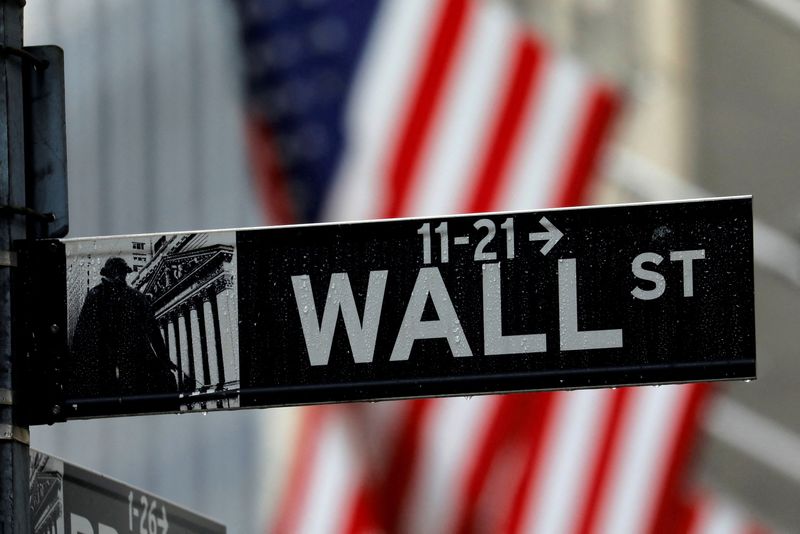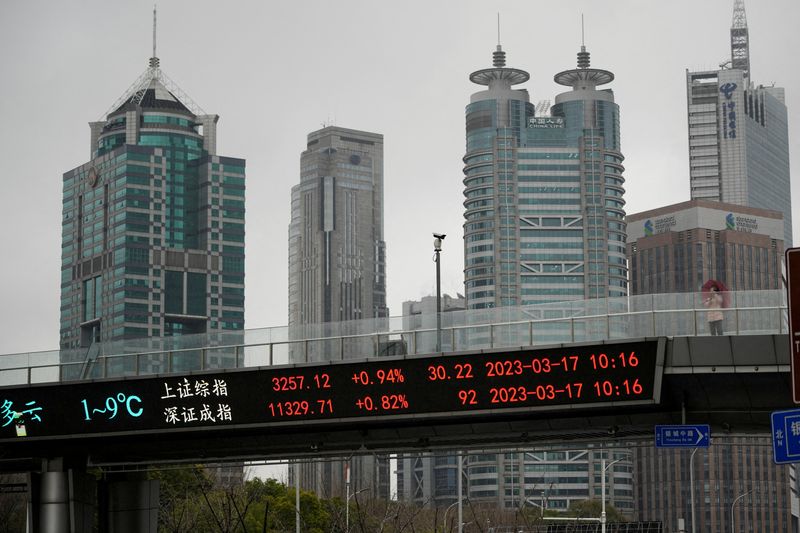By Sinéad Carew and Tom Wilson
NEW YORK/LONDON (Reuters) - MSCI's global equities index lost ground on Wednesday after weaker-than-expected overseas data and as investors monitored a heating up of American-Chinese trade tensions while they awaited upcoming U.S. economic data and second-quarter earnings.
Investors shrugged off U.S. Federal Reserve meeting minutes released on Wednesday that showed a Fed united in its June meeting decision to hold interest rates steady to buy time to assess whether further hikes would be needed. Minutes also showed most members expecting more policy tightening eventually.
"If we continue to see a cooling of inflation, there may not be any further rate hikes, but nothing to that end was disclosed in the Fed minutes," said Michael James, managing director of equity trading at Wedbush Securities in Los Angeles. "We'll have a much better sense after we get another major data point on Friday with the jobs report and the inflation data next week."
Putting a damper on equities overseas was the release earlier of a survey showing China's services sector - which had rebounded since the lifting of COVID-19 lockdowns - expanding in June at the softest pace in five months, adding to signs of a faltering recovery in the world's second-biggest economy.
A U.S. Commerce Department spokesperson said on Wednesday that the United States "firmly" opposes export controls announced by China on Monday for gallium and germanium, and that Washington will consult its partners and allies. Companies were racing to secure supplies ahead of a Aug. 1 deadline after China's abrupt decision, to restrict exports of two metals widely used in semiconductors and electric vehicles.
"If you look at the global level, all the things that came out (from China and Europe) show you that growth is still slowing and you have the geopolitical backdrop between the U.S. and China that's going to be a bit of a headache," said Jack Janasiewicz, lead portfolio strategist at Natixis Investment Managers Solutions.
Traders are betting on an 88.7% chance the Fed will hike rates by a quarter percentage point in July after pausing last month, but have priced in only a 17.7% chance for another hike in September, according to CME Group's (NASDAQ:CME) FedWatch tool.
Natixis' Janasiewicz said investors would likely tread water water ahead of the U.S. payroll numbers due Friday and inflation readings the next week along with the second-quarter corporate earnings season kickoff in mid July.
“The markets are in a wait-and-see for the economic data,” said Paul Nolte, senior wealth advisor and market strategist at Murphy & Sylvest Wealth Management. “Since the Fed is data dependent, so is the market.”
The Dow Jones Industrial Average fell 129.83 points, or 0.38%, to 34,288.64, the S&P 500 lost 8.77 points, or 0.20%, to 4,446.82 and the Nasdaq Composite dropped 25.12 points, or 0.18%, to 13,791.65.
The pan-European STOXX 600 index had closed down 0.73% and MSCI's international gauge of stocks shed 0.46% to end a six-session winning streak.
Emerging market stocks lost 0.80%. MSCI's broadest index of Asia-Pacific shares outside Japan closed 0.93% lower, while Japan's Nikkei lost 0.25%.
In currencies, the U.S. dollar edged higher against other major currencies after Fed minutes reinforced expectations of another interest rate hike at the end of the month.
The dollar index rose 0.272%, with the euro down 0.22% to $1.0853. The Japanese yen weakened 0.14% versus the greenback at 144.66 per dollar, while Sterling was last trading at $1.2701, down 0.09% on the day.
U.S. Treasury yields were mostly higher on Wednesday after a softer-than-expected reading on U.S.-made goods and the minutes from the Fed's June policy meeting did little to alter expectations for the path of rate hikes.
Benchmark 10-year notes were up 7.3 basis points to 3.932%, from 3.858% late on Monday. The 30-year bond was last up 5.3 basis points to yield 3.9295%, from 3.877%. The 2-year note was last was up 0.2 basis points to yield 4.9424%, from 4.94%.

U.S. crude oil gained ground, narrowing the price gap with global benchmark Brent in a post-holiday response to supply cuts announced on Monday by top oil exporters Saudi Arabia and Russia. And market participants were awaiting demand data from the July 4 U.S. holiday weekend, which tends to mark the peak U.S. travel season.
U.S. crude settled up 2.87% at $71.79 per barrel and Brent settled at $76.65, up 0.52% on the day.
